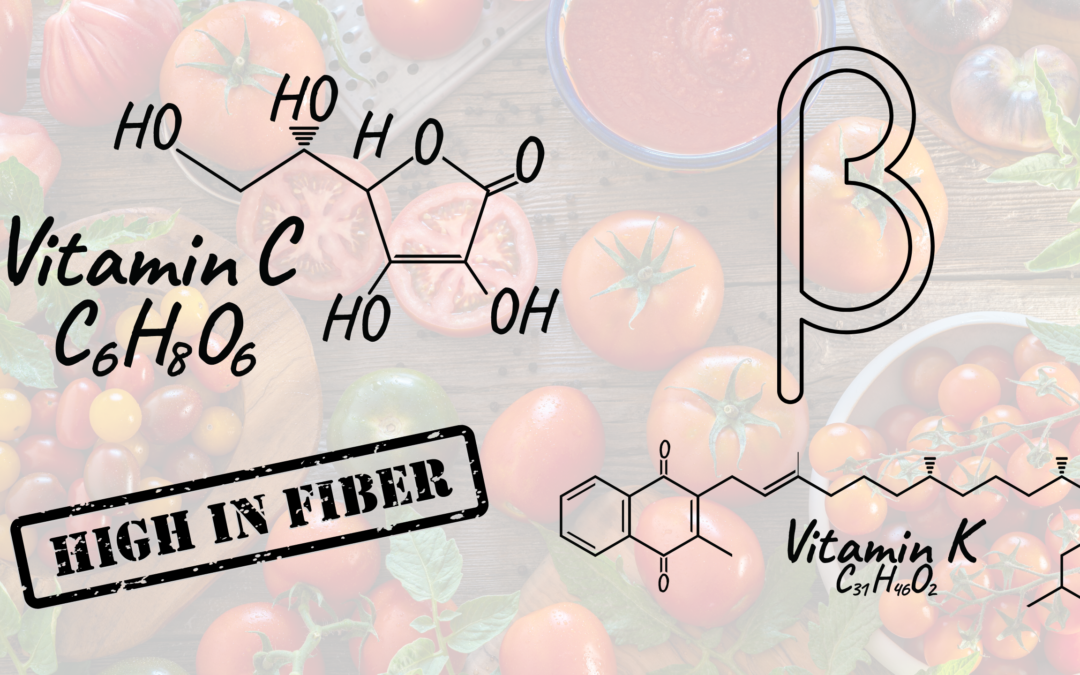
by Tomato Wellness | Jun 18, 2023 | Food and Nutrition
This Father’s Day let’s talk about men’s health. One of the most pressing health issues for men is prostate cancer, with more than 1.3 million men diagnosed each year. Use this month as motivation to take preventative steps to reduce your risk of getting prostate cancer, including getting screened at age 50, and following a healthy and balanced lifestyle that includes regular exercise and a diet rich in fruits and vegetables.
Fruits and veggies contain fiber and antioxidants that have been shown to help fight cancer and keep you healthy. One of the most potent antioxidants out there is called lycopene, which is the powerful pigment responsible for giving tomatoes their bright red color. According to several scientific studies, people who consume more tomato products have a reduced risk of developing prostate cancer, likely due to the powerful combination of lycopene, vitamin A, and vitamin C that occurs naturally in tomatoes.
While fresh tomatoes are relatively high in lycopene, the compound becomes more bioavailable as tomatoes are cooked, meaning your body can absorb more and take advantage of its anti-cancer properties. Why is this? Heat changes the structure of the lycopene molecule, making it easier for the body to take in, and helps break down cell walls, which frees lycopene and allows it to be absorbed. A recent study found that men who ate cooked tomatoes five to six times per week had a 28% decreased risk of developing prostate cancer versus those who didn’t. Eating tomato products such as tomato sauce, tomato juice, tomato soup, canned tomatoes, tomato paste, and salsa is a great way to ensure you are getting in plenty of cancer-fighting lycopene.
How exactly does lycopene exert its cancer-fighting powers? Scientists have proposed several possible methods, including stopping the growth of cancerous cells in the prostate, controlling proteins that suppress tumors, and preventing damage to DNA that can have lasting impacts on the body. While lycopene is powerful on its own, tomatoes contain other anti-carcinogenic compounds, like vitamin A, vitamin C, and fiber. That’s why you’re better off getting lycopene from dietary sources like tomatoes, rather than from a supplement.

In addition to cooking, adding a little bit of oil to your tomatoes can boost your ability to absorb lycopene even more. This is because lycopene is a fat-soluble compound, and the fat in oil helps lycopene get broken down to a form usable by the body. A serving of whole wheat pasta with tomato sauce and a side salad with olive oil and vinegar is the perfect prostate-cancer-preventing meal!
It’s so important for men to be aware of the most common conditions that can threaten health, both in Movember and beyond. Prostate cancer is a frightening possibility, but early detection and prevention is key in reducing your risk. Along with screenings and a healthy diet and exercise plan, incorporating cooked tomato products into your meals several times a week is an excellent way to make sure you are maximizing your dose of cancer-fighting lycopene.

Get your SWAG!

by Tomato Wellness | Aug 20, 2022 | Food and Nutrition, Tomato Products
Tomatoes are a superfood that contain several vitamins and nutrients that promote health. Here are 5 key nutrients present in canned tomatoes that pack a powerful nutrition punch.
When you think of the word superfood what comes to mind? Is it a tomato? Tomatoes are such a commonly eaten food filled with so much nutritional power, yet you may not think of them as a superfood. Not only are tomatoes packed with flavor, but they are also filled with important nutrients that are vital for overall health. Let’s unpack what science has to say about some of these key nutrients.
- Lycopene. Lycopene belongs to a class of compounds called carotenoids, and are powerful antioxidants that promote skin health, protect against certain cancers, and decrease the risk of heart disease and diabetes. Tomatoes are an excellent source of lycopene, but heat during the cooking process makes the lycopene even more bioavailable to our bodies, which makes canned and cooked tomato products an excellent choice.
- Beta-carotene. This is a phytochemical that is converted to retinol in the body which then becomes vitamin A. Vitamin A is important for supporting eye health and protects against cataracts and macular degeneration.
- Vitamin C. Also known as ascorbic acid, vitamin C is an antioxidant that can prevent oxidative stress. Additionally, it increases non-heme iron absorption from plant sources, while also preventing the iron inhibiting effects of calcium.
- Vitamin K. This is a fat soluble vitamin that is important for protein production. These proteins are necessary for the formation of blood clots, and the prevention of bone loss. Vitamin K has also been shown to protect against heart disease.
- Fiber. This nutrient has so many benefits, yet many people don’t get enough in their diets. Most know that fiber can promote bowel health and encourage regular bowel movements. However, it also can lower cholesterol levels, control blood glucose levels, and help maintain a healthy weight.
Tomato products should be a staple in every kitchen pantry. Not only are they quick and convenient, they contain many nutrients that promote health! The heating process that all tomatoes go through for preparation actually helps break down the cell walls and make the nutrients easier to absorb. For example, when cooked tomatoes deliver 2-3X more lycopene than a raw tomato! So, what are you waiting for? The next time you’re at the store go ahead and grab a can (or three) of some canned tomato products to use in the kitchen this week.
Need some recipe inspiration? Try out some of our favorites:
Shakshuka Pita Pizzas
Curried Veggie Rice Bowl
Swiss Chard Pecan Lasagna

by Tomato Wellness | Jun 30, 2022 | Food and Nutrition, News
There are a number of health benefits that come from the regular consumption of tomatoes and tomato products. Here’s what science has to say about the correlation between canned tomatoes and cancer prevention.
Cancer is a global health concern, and a leading cause of death worldwide. Billions of dollars are spent annually on cancer research, and a significant number of those studies focus on the effects of certain compounds found in food and their cancer prevention properties. The bioactive compounds of plant based foods have been thoroughly examined, with an emphasis on carotenoids and phenolic compounds.
One of the most potent antioxidants out there is called lycopene, which is the powerful pigment responsible for giving tomatoes their bright red color. It can also neutralize reactive oxidative species, and prevent damage to our cell’s DNA. According to several scientific studies, people who consume more tomato products have a reduced risk of developing prostate cancer, likely due to the powerful combination of lycopene, vitamin A, and vitamin C that occurs naturally in tomatoes. Along with being an antioxidant, lycopene can promote cancer cell apoptosis (ie. death), and interfere with cell signaling pathways to prevent cancerous cells from reproducing.
While fresh tomatoes are relatively high in lycopene, the compound becomes more bioavailable as tomatoes are cooked, meaning your body can absorb more and take advantage of its anti-cancer properties. Why is this? Heat changes the structure of the lycopene molecule, making it easier for the body to take in, and helps break down cell walls, which frees lycopene and allows it to be absorbed. A recent study found that men who ate cooked tomatoes five to six times per week had a 28% decreased risk of developing prostate cancer versus those who didn’t. Eating tomato products such as tomato sauce, tomato juice, tomato soup, canned tomatoes, tomato paste, and salsa is a great way to ensure you are getting in plenty of cancer-fighting lycopene.
To get the most out of your canned tomato products, try adding a little bit of oil to your tomatoes, as this can boost your ability to absorb lycopene even more. This is because lycopene is a fat-soluble compound, and the fat in oil helps lycopene get broken down to a form usable by the body. A serving of whole wheat pasta with tomato sauce and a side salad with olive oil and vinegar is the perfect prostate-cancer-preventing meal!
Looking for ways to power up your lycopene intake? Check out these recipes:
Ratatouille
One Pan Chicken Cacciatore
Eggplant Moussaka

by Tomato Wellness | Dec 3, 2021 | Food and Nutrition
Tomatoes are well used and loved throughout the world. They contain powerful phytonutrients that have made some refer to it as the wonder fruit! Keep reading to learn more about how canned tomatoes can boost health.
There’s a hype around canned tomatoes, and for good reason! Tomatoes are a “wonder fruit” that are filled with chronic disease fighting phytochemicals. It is no wonder why they have been a staple in many culture’s cuisines. Of course, canned tomatoes contain important nutrients like fiber, carbohydrates, vitamins, and minerals, but the phytochemicals are the real starts of the show!
Canned tomatoes boost health because they contain nutrients like vitamin A, vitamin C, potassium, and folate. However, there are additional compounds within fruits and vegetables that are called phytochemicals, which are non-nutritive compounds that have powerful antioxidant effects on the body. The two classes of phytochemicals found in tomatoes are carotenoids and polyphenols. The carotenoids include lycopene, phytoene, and beta carotene, and the polyphenols include flavonoids, flavanones, and flavones [1]. The great thing about these phytochemicals is that their bioavailability can be increased with ripening or with cooking. One of the phytochemicals that has powerful health properties is lycopene. Lycopene is a potent antioxidant that has shown to be helpful in the protection against certain cancers, cardiovascular disease, and other disease and conditions related to aging [1]. It also gives tomatoes their beautiful red color!
So how exactly does lycopene boost health? Diseases such as cancer and cardiovascular disease are caused by reactive oxygen species (ROS) induced oxidative stress, which can damage the proteins, lipids, and nucleic acids within the body. Lycopene is a particularly potent antioxidant that can trap ROS and reduce the damage caused by it. In an uncooked tomato, the lycopene exists in a microcrystalline form that makes it difficult to be absorbed by the body [1]. When we heat, or cook the tomatoes, the cell walls rupture and release the lycopene. Therefore, using canned tomatoes is a great way to boost the lycopene in your diet because they are already cooked!
Learn more about the benefits of lycopene with these resources:
Lycopene and Canned Tomatoes May Help with Cancer Prevention
Health Connection Between Tomatoes and Lycopene
What is Lycopene?
References:
- Chaudhary, P., Sharma, A., Singh, B., & Nagpal, A. K. (2018). Bioactivities of phytochemicals present in tomato. Journal of Food Science and Technology, 55(8), 2833–2849. https://doi.org/10.1007/s13197-018-3221-z

by Tomato Wellness | Nov 16, 2021 | Food and Nutrition, Health, News
Can eating tomatoes really help lower high blood pressure? Some studies say yes! Keep reading to learn more about the ways in which canned tomatoes have a profound effect on health.
Commonly known as high blood pressure, hypertension is a major risk factor for chronic disease such as heart attack, heart failure, peripheral arterial disease, aortic aneurysm, and chronic kidney disease [1]. Additionally, hypertension is associated with diabetes and high cholesterol, as research shows that hypertension is correlated with oxidative stress [1]. When antioxidants are used in the body, the damage of oxidative stress is lessened.
So how do antioxidants reduce hypertension? It all starts in our endothelial cells (the cells that line our blood vessels). For our blood vessels to relax, these cells secrete a substance called nitric oxide [1]. Unfortunately, harmful compounds called free radicals can attack the nitric oxide and destroy it [1]. Many chronic diseases can occur when there is an imbalance in free radicals and antioxidants. Antioxidants can remove the free radicals and stop more harmful oxidation reactions from occurring.
Studies have found, that while antioxidants can have a positive effect on hypertension, it is only seen when the antioxidants come from diets high in fruits and vegetables, but not from antioxidant supplements. It’s theorized that this is because fruits and vegetables contain a wide variety of antioxidants that work together and create a powerful chain of antioxidants [1]. That’s why we love canned tomatoes! They are rich in antioxidants, and contain lycopene in addition to other phytochemicals (like beta carotene) that can work together to prevent disease.
So, go ahead and boost your health with canned tomato products! They are shelf stable, easy to use, and contain a more bioactive form of lycopene compared to fresh tomatoes. What’s not to love?
Learn more about the benefits of lycopene with these resources:
Lycopene and Canned Tomatoes May Help with Cancer Prevention
Health Connection Between Tomatoes and Lycopene
What is Lycopene?
References:
- Baradaran, A., Nasri, H., & Rafieian-Kopaei, M. (2014). Oxidative stress and hypertension: Possibility of hypertension therapy with antioxidants. Journal of Research in Medical Science, 19(4). Retrieved November 15, 2021, from https://www.ncbi.nlm.nih.gov/pmc/articles/PMC4115353/.








Recent Comments